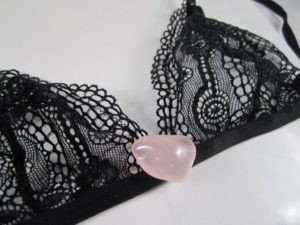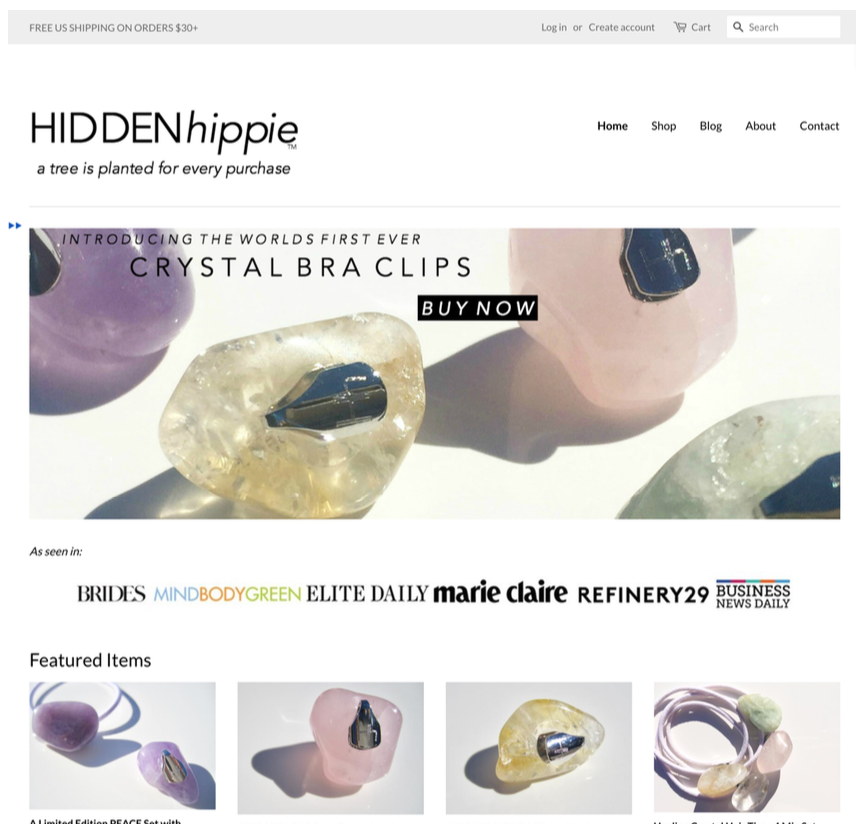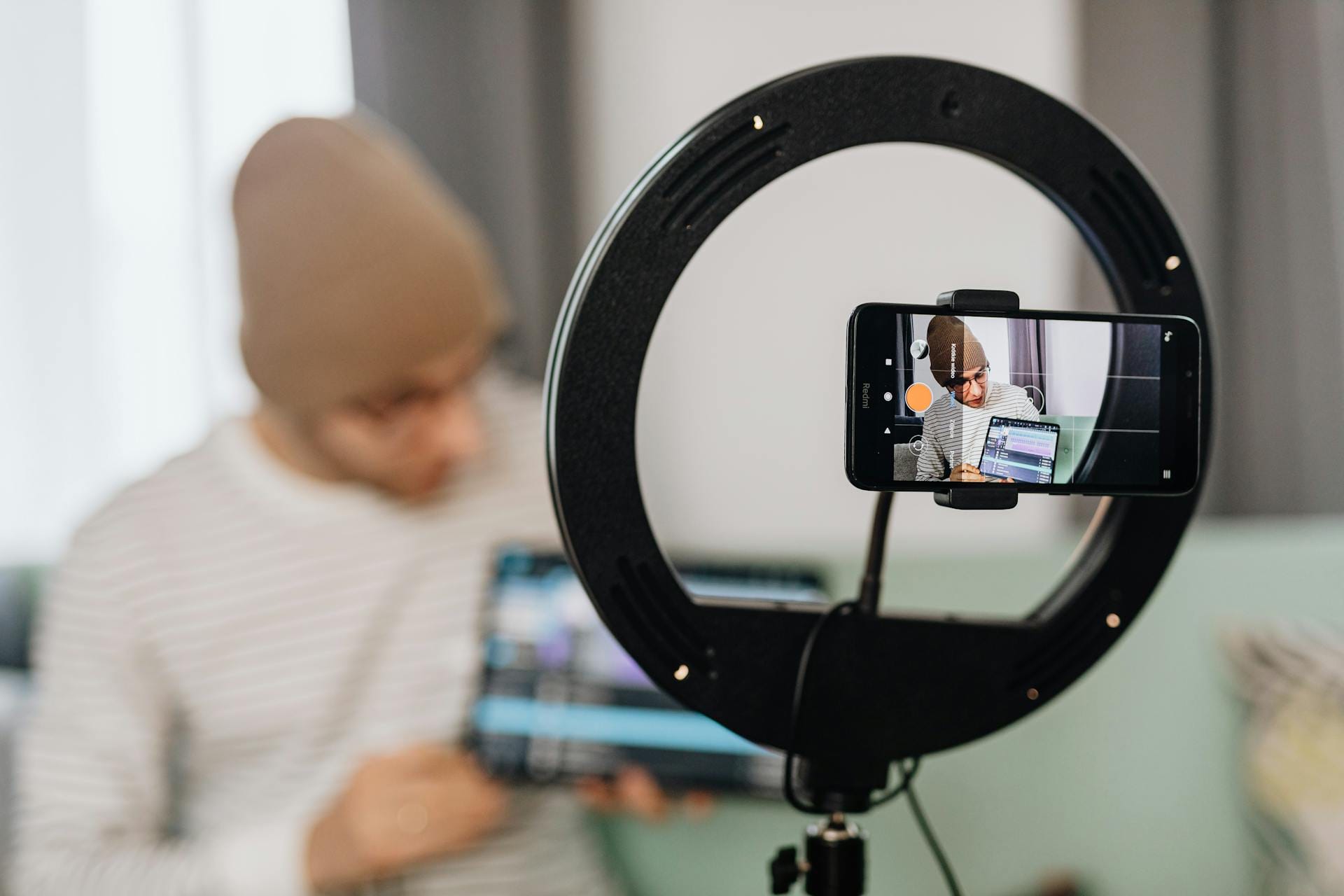
5 must-know lessons I learned from starting a crystal business (after leaving the corporate world)
Before, I climbed the corporate ladder. Now, I have a crystal business, selling crystals for a living.
In this post, I’m going to walk you through the 5 essential lessons I learned along the way (that made me more confident starting a business selling crystals was the right choice for me) including:
Funny thing how being an entrepreneur works: we entrepreneurs have to challenge a lot of our assumptions on our way to building something people love. As a result, our ideas change, our products change, and sometimes our customers change as we figure out what works.
But there’s another change that most people don’t acknowledge:
When you start a business, you are also deciding to change YOU. And that can be scary.
There are a lot of challenging things about launching a business, but the hardest for me by FAR was adapting to this new identity change, one where I went from climbing the corporate ladder to becoming an entrepreneur. And not just any entrepreneur, but one that sells healing crystals online.
Let’s start from the beginning:
My first “real” job was as a management consultant and, well, it gave me a lot of pride. It was fun to tell people about my well-known clients. It was fun to make good money. It was also fun to be employed doing something I was good at. But just because you’re good at something doesn’t mean you enjoy doing it. Soon I found myself in tears before work as I found the environment too unfriendly and unwelcoming. It was toxic and I had to go.
Every so often I’d get a raise and I’d feel better in the short-term. But I started to come to terms with the idea that I would need to start something on my own to truly be free. So I thrashed around a bit and stopped and started some businesses. It’s hard to get out of a job you dislike when you’re always in a negative headspace.
I even tried to remind myself of my goals by writing affirmations down on a piece a paper like all the self-help books told me to do. That is, until I accidentally left them on my desk and a co-worker spotted them. That was an eye-opening lesson, so I needed some way to remind myself to stay positive but in a passive way that left me no chance of being “found out.”
I’d always thought myself to be a tough corporate-ladder-climber. Not some “positive thinking will solve everything!” person at your local coffee shop. Right? Right. So instead of writing down goals I began discreetly carrying crystals.

A current version of my Rose Quartz crystal bra clip (unconditional love included).
If you are reading this and you just rolled your eyes, I know. I’ve been there. Believing in the healing power of crystals is about as anti-management consultant as it gets. And after my goal list was found I was determined to keep it as my secret — to not let my coworkers know me as the weird crystal lady. (I’d have to settle being the lady who writes down her goals and leaves them around.)
Eventually, I had a really nasty client, one where every email was combative. The kind where I’d have to collect myself before engaging. So as a little reminder to stay calm and lead with love, I started carrying a rose quartz crystal in my bra (the stone of “unconditional love” if you’re curious). It sounds stupid, but the subtle reminder DID put me in a better mood. It was like when you decide you want to buy a certain kind of car and begin seeing it everywhere.
Eventually one of the women I worked with remarked that I was in a better mood, and I confessed: I had a rotation of crystals hidden in my bra. Rather than ridicule, that person and a few of her friends went out and purchased crystals, a few of them even purchased extra ones and mailed them to their friends. I soon designed a clip to attach them discreetely. In our male-dominated office it was our little secret.

Here’s the killer: Despite this, I was STILL struggling to find a business. I thought that in order to retain my prestige I would need to start some tech company with VC funding. Meanwhile, starting a crystal business was staring me right in the face but I was still looking for something a bit more “normal” — something people I met at parties would understand. I couldn’t let my ego handle the fact that I was becoming a “trust the universe” crystal pusher. I wasn’t ready to have everyone laugh at me again.
Soon, even the men found out and bought them for their girlfriends. I realized this could be a viral thing and had some legs. Yet, I STILL wasn’t totally prepared to make the leap to start selling crystals online. So I realized I had to build a bridge. My ego would remain intact if I had some sales coming in. So I built my site, named “Hidden Hippie” as an homage to the product’s discrete nature and my reluctance to embrace the lifestyle change.
I had to re-prioritize, there’s only so long you can feed your ego until it starts eating your soul. But I wasn’t prepared to totally put myself out there and it took me awhile to get to the point where I was comfortable telling people what I did.
Leaving a secure job with prestige and recognition, that people immediately understand, for the entrepreneurial life is one thing. Leaving it to launch a business that, although profitable from day one, still makes you a little embarrassed or self-conscious is another.
Here’s how I worked my way through the identity shift and went from self-conscious wreck to totally owning what I do:
Lesson #1: Ask for support, not permission (from people you care about)
Make a list of the three to four people whose opinion you really care about. Then be transparent with them about your decision to start a niche business, no matter how out of the blue it may seem to them (or you).
You are NOT asking for their permission — in fact, I’d suggest keeping it private until you’re sure you’re ready to commit. This isn’t about letting them change your mind, it’s about asking for the support you need.
This process helped me realize whose opinion I did value and to discard the rest. If some random person I don’t know laughs in my face when I tell them about selling crystals online? Who cares. They’re not on my list of people that matter (or my email list).
One way to start this conversation is to let them know you’ve put serious consideration into the decision and replace non-committal words like “think” with “am.”
Here’s an example:
Instead of, “I’m thinking about selling crystals full time, I think it’s a pretty good idea. Sooo ahh yeah, that’s what I’m going to do.”
Try:
“Over the last few months I’ve been getting a lot of positive feedback from people about my crystals. People keep asking for them and offering to pay! So I dug a little deeper and decided it’s what I’m going to do.”
Second, by being upfront I could talk about it on my terms. So, instead of receiving judgement (that often comes from loved ones being taken by surprise), I was given what I asked for: sensitivity, support, and positive curiosity.
A funny thing happened during this process: My friends and family became my biggest sources of strength. After deciding to pursue Hidden Hippie, my parents began to tell me I sounded like a different person. It was like I was someone who was dieting and losing weight. I may not have noticed my progress, but my friends and family always remarked how much more at peace I seemed. It was just the motivation I needed to get over the inevitable tough times.
…but you don’t have to take the same path as everyone else. How would it look if you designed a Rich Life on your own terms? Take our quiz and find out:
Lesson #2: You are NOT defined by your business
Your business may be niche, but you are not.
Especially in the early days, it can be hard to separate yourself from the business. It can feel like it’s a total reflection of you. But it’s not. It’s one part of you and your life. Your business needs a niche. You, as a person, do not.
Constantly reminding yourself that you are not defined wholly by your business can ease the transition dramatically. For example, I love to hike. Am I going to start a hiking business? Probably not. My friend is an accountant. Does he only talk about receivables? No! (Thank God…)
My crystal business is a little… alternative. But I, myself, am not 100% out there. And you know what, the likelihood of this business being my career focus forever is at about 1%. It’s great for now, but people change so there’s no point totally attaching my identity to it.
Internalizing that can make all the difference.
Lesson #3: Take control (and responsibility) of the story you’re telling yourself
The words you use to describe yourself to others can have a biiiiiig impact on how they respond to you.
The same goes with what you identify as internally. What you tell yourself will garner different emotional responses — one may make you embarrassed, the other confident.
For example, initially I would tell myself the story “I sell healing crystals. Yep, I went from a secure corporate job to crystals. Geez, who am I? I went from being taken seriously to nut-job.” I can guarantee that story did not feel good.
So I switched it –- “I run a super fun crystal business where I get to make things with my hands every day, and people love it. It puts a smile on a lot of faces.”
That simple switch made a huge difference to how I felt about the work I do. There are a thousand ways to talk about what you do for a living. Experiment. I went from “I make women’s accessories” to “I make crystals” to “I own my own business” and every version in between.
One warning: Creating your own business is an act of vulnerability. On some days, the slightest criticism can wreck your confidence. It’s important to test how to frame yourself, but don’t do it if you’re not ready to hear negative feedback. I’ll admit: when someone makes a joke about my business, something I put my name to, it can feel raw. Know your limits and protect yourself.
Lesson #4: Get validation from your customers, not your friends
One of the hardest things about a new identity is that it’s easy to be overcome with self-doubt and imposter syndrome. When you focus on the benefits you’re providing to people, it makes it a lot easier to ignore anyone that might judge you (or judging yourself!) for your services.
So, I stopped asking friends “What do you think of my business? Is it totally ridiculous?” and instead reached out to customers I’d never met for unbiased feedback. Best. Decision. Ever.
Getting direct feedback from customers about how Hidden Hippie was benefiting them really gave me the confidence bump I needed. It also gave me great ideas on how to improve the product, what topics I should write about and other ways I could help the people I’m serving.
Lesson #5: The BEST way to find confidence is by focusing on sales
Last but not least, the easiest and fastest way to become confident in what you’re doing is to get paid for it.
People pay for what they value. And when your work feels valued, well, that’s pretty awesome.
When I started actually selling crystals to customers that weren’t from supportive friends and family, my self-doubt started to slide away. Now, when I come across critics (they’re everywhere) I just smile to myself knowing that they just don’t get it, and they don’t need to.
And all those people I admired raising money and starting tech companies? I feel a lot better knowing that little old me is more profitable. And zen. Suuupppper zen. ***
The struggle with an identity change comes down to a whole lot of fear. I was terrified of being judged, ridiculed and not being taken seriously. But with these steps I was able to get over it and keep moving forward. So give it a crack. If worst comes to worst, just remember that The Universe totally has your back. 😉
If you liked this post, you’ll LOVE my Insider’s Newsletter
Join over 800,000 readers getting content that’s not available on the blog, free:



